Children’s mental health – child psychotherapist reveals key signs to look out for
Worried about your children’s mental health? Child psychotherapist Dr Alison McClymont reveals the key signs to look out for
One in six children aged five to 16 were identified as suffering a possible mental health disorder in 2020 – that’s an increase from one in nine children in 2016.
Childhood is a rollercoaster and it is completely normal to struggle with developing brains and bodies and to sometimes show behaviours or responses that aren’t desirable.
After all, children are learning every day how to cope with different hormone surges and brain development
One in six children aged five to 16 were identified as suffering a possible mental health disorder in 2020
Usually, obvious examples of mental health triggers are abuse, neglect or maltreatment in the home. Others can be bullying, bereavement or divorce.
But most recently, the pandemic has created huge amounts of anxiety and stress across the population and in some children this has been experienced as fear of germs or dying and has even become full blow OCD for some.
If your child is showing maladaptive responses to an event such as obsessive behaviours or extreme emotional outbursts, it might be worth considering that they need some help.

What key signs should parents and teachers be looking out for?
Key signs of bad mental health, are changes in behaviour that are marked and noticeable.
What we mean by this is a change that is either developmentally inappropriate or uncommon for your particular child.
Examples of a change in behaviour could be sudden physical outbursts or verbal aggression, or becoming more tearful than normal, with seemingly little provocation.
It could also be a change that causes significant distress to the child – such as verbalising a lot of fears or anxious thoughts.
Experiencing night terrors or feeling scared to go to sleep can also suggest an underlying anxiety
Look out also for changes in eating or sleeping patterns, also a new onset of toilet trouble, withdrawing from things they once enjoyed, new onset irritability or emotional outbursts, or simply saying ‘I don’t feel good’.
Experiencing night terrors or feeling scared to go to sleep can also suggest an underlying anxiety, as can significant changes in eating patterns – such as refusing to eat or bingeing.
Changes in toilet behaviours could be ‘deliberate’ soiling of underwear, refusing to use the toilet, or sudden onset of bed wetting.
Of course these should take in to account the age of the child, with the understanding it is not uncommon for four to five year olds to regress a little with previously good toilet habits, but it would be uncommon for an eight to nine year old.
The key point is: what was previously normal for your child? Has something changed?

How can parents & teachers help children?
Children sometimes lack the emotional vocabulary to explain what they feel, so it can also be helpful to offer them examples of emotions they might feel, or to help them define the difference between emotions such as anger or sadness.
Parents and teachers can try to maintain an open dialogue with children about both positive and negative emotions and remind them that the experience of BOTH is normal. They should understand that it’s absolutely OK to say I feel angry, sad or embarrassed about something.
Children sometimes lack the emotional vocabulary to explain what they feel
Normalising these emotions can help to open up conversations. It is key that we do not ‘reject’ emotions such as sadness or anger as ‘bad’ – these are normal responses but we have to find ways to express them without being self-destructive.
For example it is helpful to remind children ‘anger is allowed, but aggression is not’, or ‘being sad can help us to feel empathy towards others and can be a useful connecting emotion’.













